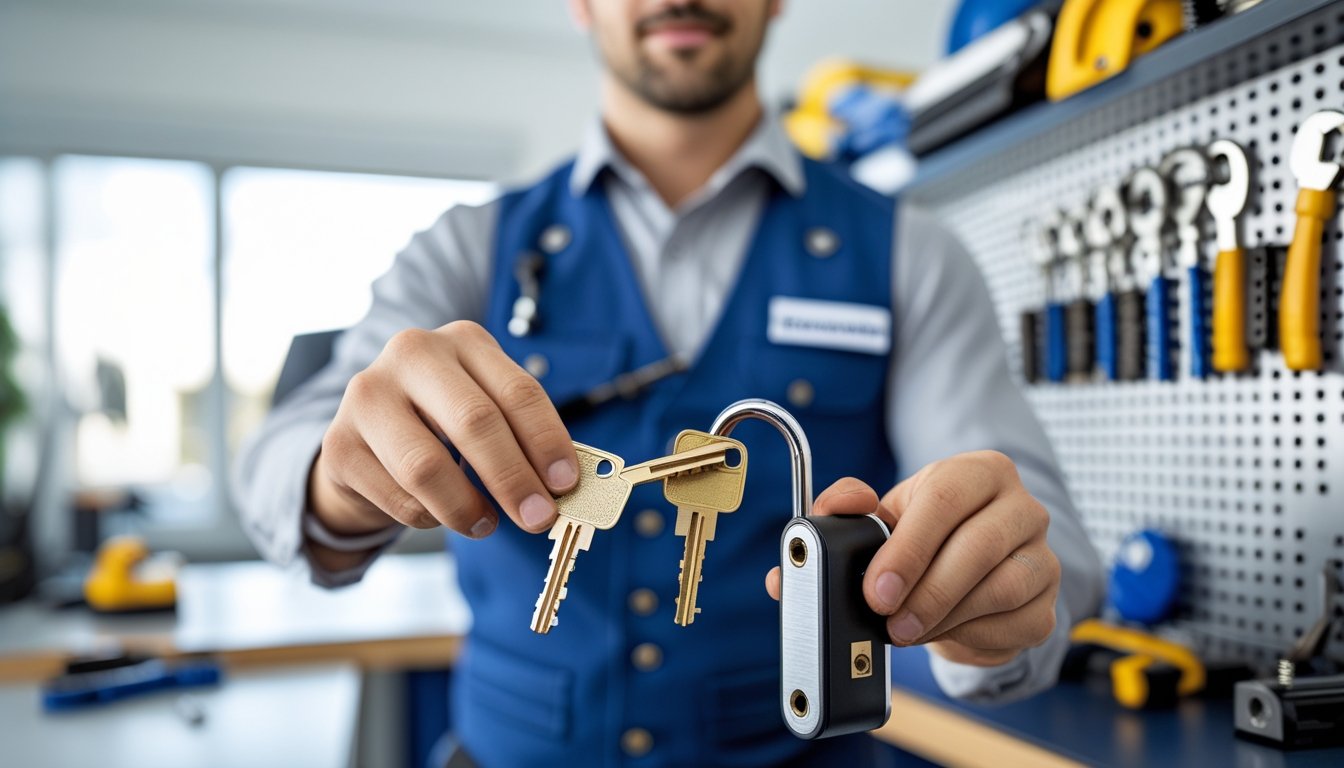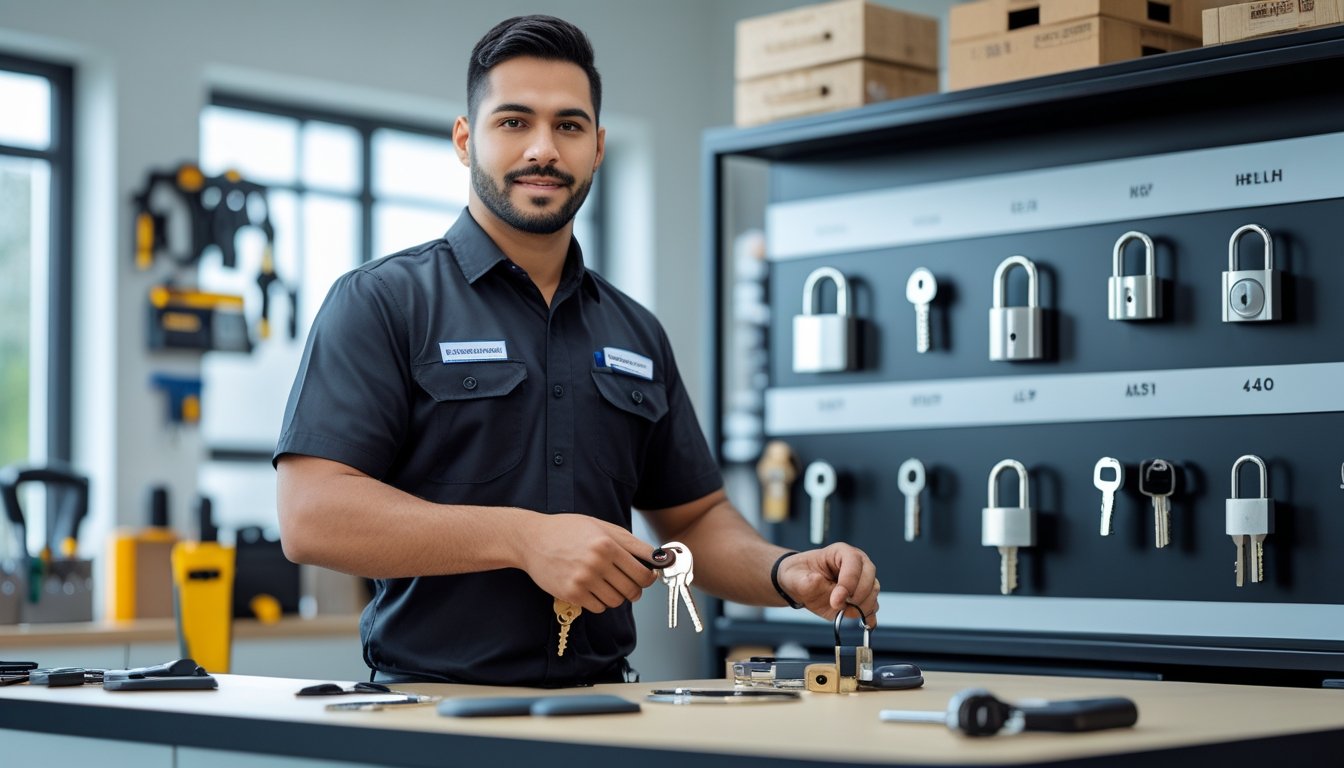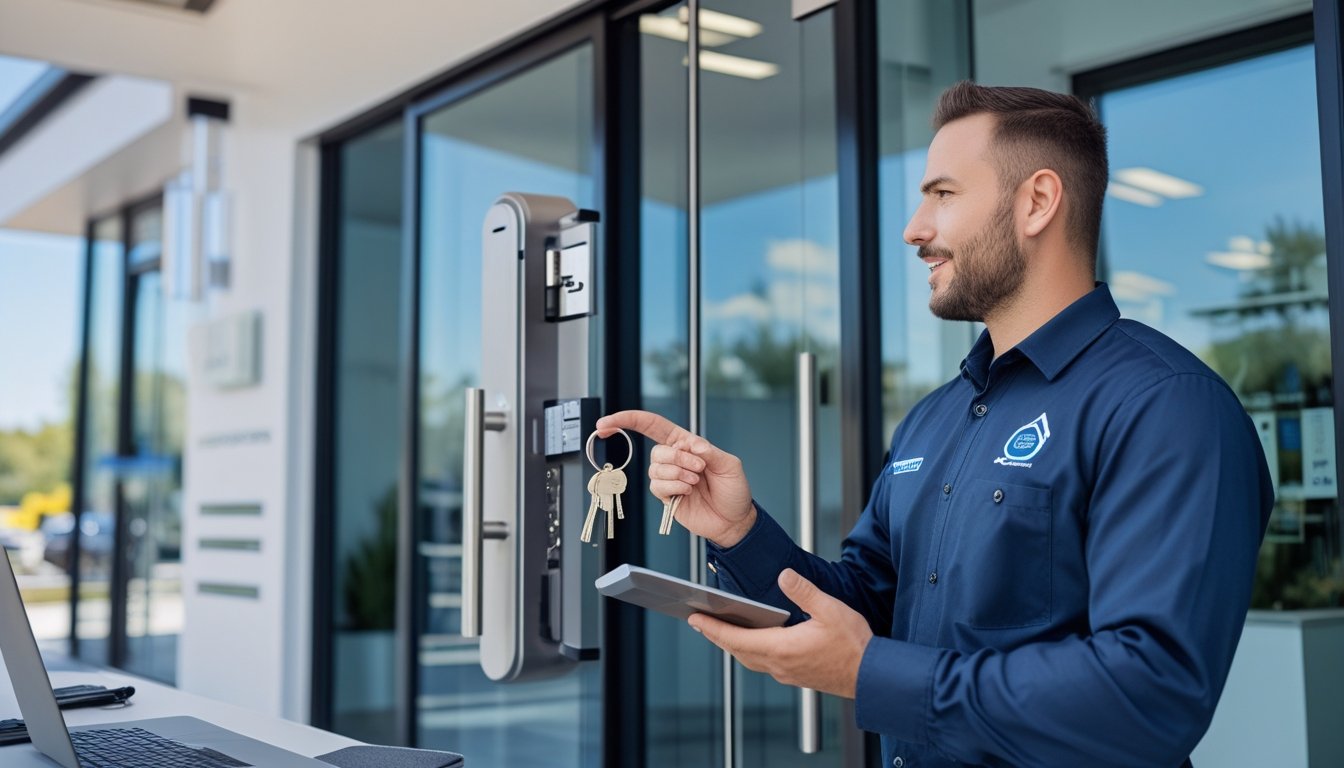Late updated: 31 May 2025 09:05
Written by: Elena Prescott
Guide To Choosing The Right Locksmith For Your Business: Ensuring Security and Reliability
In today’s world, businesses face a variety of security challenges, making it essential to choose the right locksmith to safeguard your assets. Selecting a reputable locksmith involves identifying your specific security needs and ensuring they have the credibility necessary to handle your requirements effectively. Whether it’s upgrading existing systems or addressing immediate security concerns, a professional locksmith can provide tailored solutions that offer peace of mind.

We've all heard stories of unexpected lockouts or security breaches, highlighting the urgency of having a reliable locksmith on call. In our blog post, we walk you through the steps to find a trustworthy locksmith, explore the significance of choosing local services over national call centres, and explain how to distinguish qualified professionals by verifying credentials and seeking proven reviews. Our insights will equip you to make informed decisions and link you with locksmiths who offer genuine transparency.
Understanding your business's security needs and comparing options are crucial elements of making the right choice. An informed choice not only secures your business but also enhances trust with employees and clients. Dive into the details with us, and learn how to ensure your establishment is in the safest hands possible.
Key Takeaways
- Identify your specific security needs.
- Choose a locksmith with proven credibility.
- Rely on professional reviews for trustworthy services.
Understanding Your Business Security Needs

Proper security measures ensure the safety of a business's assets, employees, and information. We must address the unique security challenges each business faces to implement suitable solutions.
Assessing Commercial Security Vulnerabilities
Identifying weaknesses is the first step in reinforcing security. We should conduct thorough inspections of access points, evaluate the existing door hardware, and examine surveillance coverage. Potential vulnerabilities, like poor lighting, outdated locks, or inadequate monitoring, can be exploited by intruders.
It's crucial to consult with security experts to conduct thorough risk assessments. This helps us prioritise areas needing immediate action. Properly assessing vulnerabilities allows us to implement effective security measures.
Identifying Required Types of Locks
Choosing the correct locks is essential for deterring unauthorised access. We need to consider factors like location, type of business, and level of traffic. High-security locks may be ideal for areas storing valuable items, while simpler locks could suffice for less critical spaces.
Available options include deadbolts, mortice locks, and cylinder locks, each suited to different security needs. Understanding the differences between these types ensures we select hardware that offers optimal protection. This decision is pivotal in strengthening the overall security framework.
Evaluating Keyless Entry and Electronic Locks
Keyless entry systems and electronic locks offer modern solutions to traditional security challenges. They eliminate the need for physical keys, offering advanced features like access logs, remote control, and customisable access levels.
Evaluating such systems involves considering the business's digital security infrastructure and budget. Popular choices include keypads, card readers, and biometric scanners. These systems enhance security by providing real-time monitoring and flexibility in access management. Adopting electronic locks can significantly streamline operations while enhancing security control.
Selecting a Reputable Locksmith for Your Business

Choosing a trustworthy locksmith is pivotal for business security. This involves verifying professional credentials, exploring services, comparing various services such as lock installation, and assessing customer feedback.
Verifying Professional Credentials and ALOA Membership
Before entrusting anyone with the security of our business, verifying their professional credentials is essential. A reputable locksmith should have proper licensing and certifications, demonstrating their adherence to industry standards. The Associated Locksmiths of America (ALOA) is a prominent organisation verifying these professionals. Membership in ALOA adds an extra layer of credibility and assurance that we are dealing with skilled individuals. We should always ask for proper identification and documentation when hiring these services to ensure transparency.
Exploring Commercial Locksmith Services Offered
Commercial locksmiths offer a range of services tailored to business needs. These can include lockouts, lock installation, rekeying, and repair services. It's important to understand what each locksmith specialises in, as not all offer the full spectrum of services. By assessing their service list, we can determine who best fits our requirements. Additionally, some locksmiths may offer modern security solutions, including electronic access systems. Understanding these options helps us make informed decisions about our business security needs.
Comparing Lock Installation, Rekeying, and Lock Repair
Lock installation, rekeying, and repair are commonly required services. Lock installation is crucial when establishing or upgrading premises. A reputable locksmith can guide us on choosing robust locks. Rekeying allows us to maintain existing hardware while changing the keys—ideal for new business ownership. Meanwhile, lock repair addresses wear and tear. Comparing these services across providers ensures we receive both quality work and fair pricing. It's vital to discuss these options with potential locksmiths to understand their expertise and service standards.
Evaluating Customer Service and Online Reputation
A locksmith's customer service is as important as technical skill. We should look for service providers who offer prompt, courteous, and reliable communication. Evaluating their online reputation can offer insights into their level of service. Platforms like Facebook and business review sites enable us to see genuine customer feedback. While it's normal to encounter the occasional negative review, the overall pattern should reflect consistent quality and reliability. Checking how they respond to feedback also reveals their dedication to customer satisfaction.
Frequently Asked Questions

When choosing a locksmith for business purposes, it is vital to focus on trustworthiness, qualifications, and cost-effectiveness. We will explore factors such as credentials, reputation, and pricing to ensure a sound decision.
What factors should be considered when selecting a locksmith for commercial needs?
Selecting a locksmith requires assessing licensing, insurance, and the specific services offered. We recommend checking for specialisation in commercial locks or security systems. This ensures that the locksmith can meet business-specific needs effectively.
How can one ensure the reliability and trustworthiness of a locksmith?
Reliability is verified through references and customer reviews. We should also confirm membership with professional regulatory bodies. This approach helps in establishing the locksmith's credibility and professionalism, assuring quality service.
What qualifications and experience are advisable for a business locksmith?
Look for a locksmith with certifications from recognised institutions and training centres. Experience in handling commercial security issues is crucial. The locksmith should possess a track record of successfully managing business installations and emergencies.
How does one determine a reasonable fee for locksmith services?
Obtaining multiple quotes is advisable to gauge fair pricing. Be wary of hidden fees by ensuring all costs are clearly stated upfront. Comparing prices with the industry standard can also help in negotiating an appropriate fee for the services required.
What are some tips for verifying the reputation of a local locksmith?
To verify reputation, review online platforms for feedback and ratings. Engaging with local business forums for recommendations can also prove beneficial. Doing this groundwork helps secure a reliable locksmith with a solid community standing.
Which credentials or industry codes should be reviewed when hiring a locksmith for business premises?
We should check for compliance with local and national regulations relevant to locksmith services. Look for certifications such as MLA (Master Locksmiths Association) for benchmarks of quality. These credentials assure adherence to industry best practices.
